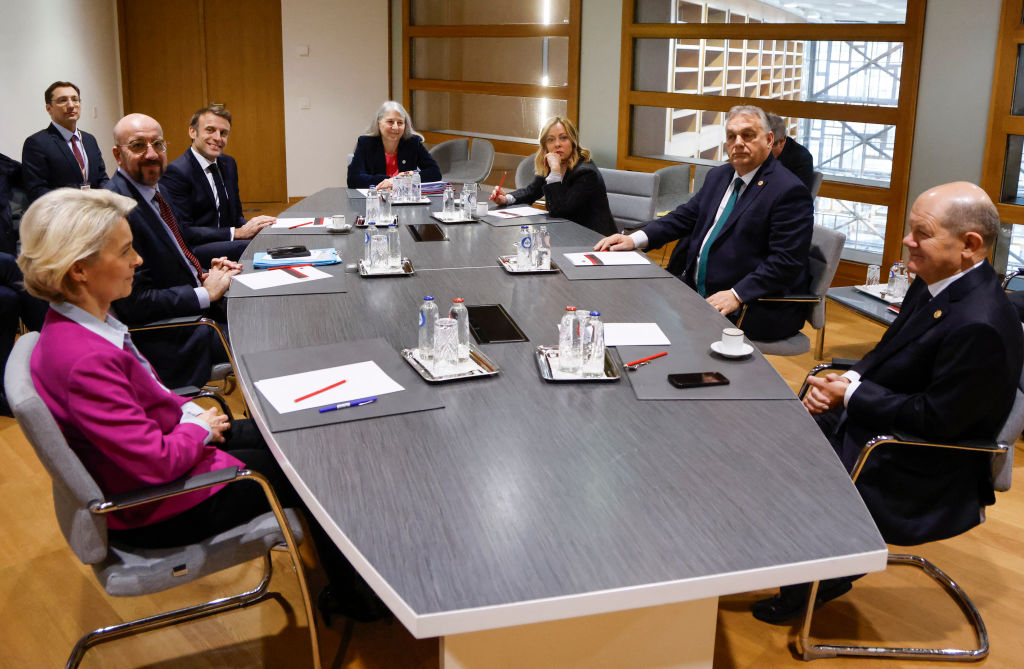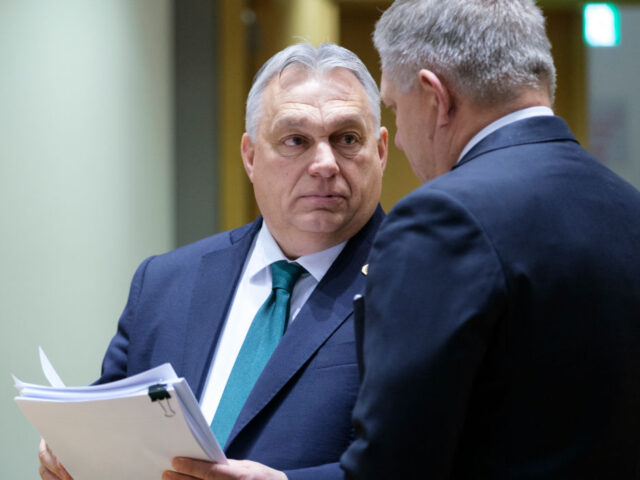The European Union has agreed a mammoth €50 billion ($54bn) aid package for Ukraine after Hungarian leader Viktor Orban was pushed into dropping his demand that funding be subject to annual confirmation votes, allegedly on pain of severe punishment by the bloc if he didn’t step aside.
A large aid package for Ukraine from the European Union has been approved, Hungary’s Vikor Orban having dropped his opposition, despite having previously blocked the measure at the previous Union meeting of heads of state in December. The BBC reports Ukraine expects to receive the first payments as soon as March, and that it will pay for “pensions and salaries and other costs over the next four years”.
The agreement on the funding was required because the European Union is already running out of money from the budget it had agreed to run from 2021 to 2027, thanks to exceptional and massive spending on Coronavirus and Ukraine.
Brussels had been braced for a “showdown” between heads of state at a crunch summit today, as the bloc tried to push through a significant aid package in the teeth of strong opposition by the Hungarians. In matters of foreign affairs and budget, all member states of the European Union hold an absolute veto — a safeguard baked in to protect small states from being steamrollered by the large — and Hungarian leader Viktor Orban argued it wasn’t in the interest of Europeans to prolong the war, nor to give such a large amount of money away.

TOPSHOT – European Commission President Ursula von der Leyen (L), European Council President Charles Michel, France’s President Emmanuel Macron, Italy’s Prime Minister Giorgia Meloni (3rdR), Hungary’s Prime Minister Viktor Orban and Germany’s Chancellor Olaf Scholz attend a multilateral meeting on the sidelines of a European Council meeting at the European headquarters in Brussels, on February 1, 2024. EU leaders are to gather in Brussels on February 1, 2024, for a meeting of the European Council, where they will discuss aid to Ukraine as the war nears its second anniversary. (Photo by Ludovic MARIN / AFP) (Photo by LUDOVIC MARIN/AFP via Getty Images)
The Hungarian compromise offered was rather than to sign off on years of aid for Ukraine all in one go, it would be subject to re-confirmation annually, giving heads of state regular points of reflection for oversight. The European Union strongly criticised this position because subjecting extra cash for Ukraine to an annual vote would give Orban a chance to block the money and make demands in its own interest every year for the rest of the budget, which Brussels — which is often at loggerheads with Budapest — is clearly keen to avoid.
Indeed, both sides have accused each other of using ‘strong-arm tactics’. Orban’s willingness to wield his national veto has caused deep controversy in Brussels and even calls for the very constitutional basis of the Union to be reformed to deprive him of the tool, potentially undermining one of the key checks and balances that keeps the union together. The Union, meanwhile, has been accused of blackmailing Hungary with threats of financial “armageddon” if it doesn’t fall into line.
Orban had previously said the strong push to force Budapest to commit to multiple years of funding for Ukraine is motivated by concerns about the European people having their say in the matter in the upcoming European Parliament elections in June, in which populist right-wing parties — who are generally sceptical of the war in Ukraine — are set to see big gains and are currently projected to win elections in at least nine member states.
“In five months there will be elections in Europe. We would be completely neglecting the opinion of Europeans by making a decision today which would commit Europe over four years and which involves an enormous sum! As if the opinion of the people had no importance and whatever the result of the European elections in June… If Europe intends to behave like a democratic community based on the rule of law, we simply cannot take such a decision,” Orbán said.
Hungary standing aside for the cash package is the second such climbdown over Ukraine recently, with the country also signing off on the bloc moving towards making Ukraine a member state last year, despite having said it would stand against it.
European leaders celebrated the deal, but for Ukraine the inking of the €50 billion deal was an opportunity to ask for more. Expressing his gratitude for the cash, Ukrainian President Zelensky nevertheless was quick to point out that Europe isn’t sending enough weapons. Per The Guardian, he told the summit by video link that: “Unfortunately, the implementation of the European plan to supply one million artillery shells to Ukraine is being delayed. And this too is a signal of global competition, in which Europe cannot afford to lose.
“And that’s why today your unity is so needed in creating the Ukraine Assistance Fund within our European Peace Facility. This is the kind of reliability and long-term support which we now have to set against the corresponding challenges. Not less than 5 billion euros per year, for a term of 4 years. A clear priority.”

COMMENTS
Please let us know if you're having issues with commenting.